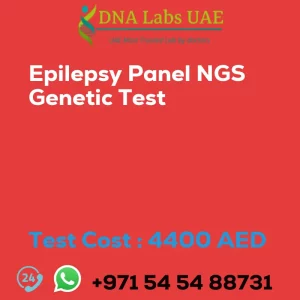PRKCG Gene Spinocerebellar Ataxia Type 14 Autosomal Dominant Genetic Test
At DNA Labs UAE, we offer the PRKCG Gene Spinocerebellar Ataxia Type 14 Autosomal Dominant Genetic Test. This test helps diagnose Spinocerebellar Ataxia Type 14 (SCA14), a rare genetic disorder that affects the central nervous system, specifically the cerebellum.
Test Components
The test includes the following components:
- Price: 4400.0 AED
- Sample Condition: Blood or Extracted DNA or One drop Blood on FTA Card
- Report Delivery: 3 to 4 Weeks
- Method: NGS Technology
- Test Type: Neurological Disorders
- Doctor: Neurologist
- Test Department: Genetics
Pre Test Information
Prior to the test, it is important to provide the clinical history of the patient who is going for the PRKCG Gene Spinocerebellar Ataxia Type 14 Autosomal Dominant NGS Genetic DNA Test. Additionally, a genetic counseling session will be conducted to draw a pedigree chart of family members affected with SCA14.
Test Details
SCA14 is an autosomal dominant condition caused by mutations in the PRKCG gene located on chromosome 19. These mutations result in the production of a faulty protein called protein kinase C gamma (PKC), which disrupts the normal functioning of the cerebellum.
The NGS (Next-Generation Sequencing) genetic testing technique allows for the simultaneous analysis of multiple genes or the entire genome. In the case of SCA14, the NGS genetic test identifies mutations in the PRKCG gene. A DNA sample is obtained, typically through a blood sample or a cheek swab, and then sequenced using NGS technology to detect variations or mutations in the PRKCG gene.
If a mutation is identified, it confirms the diagnosis of SCA14. Genetic testing for SCA14 can be beneficial for individuals with a family history of the condition or those experiencing symptoms associated with ataxia. It helps confirm the diagnosis, provides information about disease progression and prognosis, and assists in family planning and genetic counseling.
It is important to note that genetic testing for SCA14 should be performed by healthcare professionals or genetic counselors specializing in genetic disorders. They can provide guidance and support throughout the testing process and help interpret the results.
| Test Name | PRKCG Gene Spinocerebellar ataxia type 14 autosomal dominant Genetic Test |
|---|---|
| Components | |
| Price | 4400.0 AED |
| Sample Condition | Blood or Extracted DNA or One drop Blood on FTA Card o |
| Report Delivery | 3 to 4 Weeks |
| Method | NGS Technology |
| Test type | Neurological Disorders |
| Doctor | Neurologist |
| Test Department: | Genetics |
| Pre Test Information | Clinical History of Patient who is going for PRKCG Gene Spinocerebellar ataxia type 14, autosomal dominant NGS Genetic DNA Test A Genetic Counselling session to draw a pedigree chart of family members affected with PRKCG Gene Spinocerebellar ataxia type 14, autosomal dominant |
| Test Details |
Spinocerebellar ataxia type 14 (SCA14) is a rare genetic disorder that affects the central nervous system, specifically the cerebellum. It is an autosomal dominant condition, meaning that individuals who carry a single copy of the mutated gene will develop the disease. The PRKCG gene, located on chromosome 19, is associated with SCA14. Mutations in this gene lead to the production of a faulty protein called protein kinase C gamma (PKC). This abnormal protein disrupts the normal functioning of the cerebellum, leading to the symptoms of SCA14. NGS (Next-Generation Sequencing) is a genetic testing technique that allows for the simultaneous analysis of multiple genes or the entire genome. In the case of SCA14, an NGS genetic test can be used to identify mutations in the PRKCG gene. The NGS genetic test for SCA14 involves obtaining a DNA sample, typically through a blood sample or a cheek swab. The DNA is then sequenced using NGS technology, which can detect variations or mutations in the PRKCG gene. If a mutation is identified, it confirms the diagnosis of SCA14. Genetic testing for SCA14 can be beneficial for individuals who have a family history of the condition or for those who are experiencing symptoms associated with ataxia. It can help confirm the diagnosis, provide information about disease progression and prognosis, and assist in family planning and genetic counseling. It is important to note that genetic testing for SCA14 is typically performed by healthcare professionals or genetic counselors who specialize in genetic disorders. They can provide guidance and support throughout the testing process and help interpret the results. |








